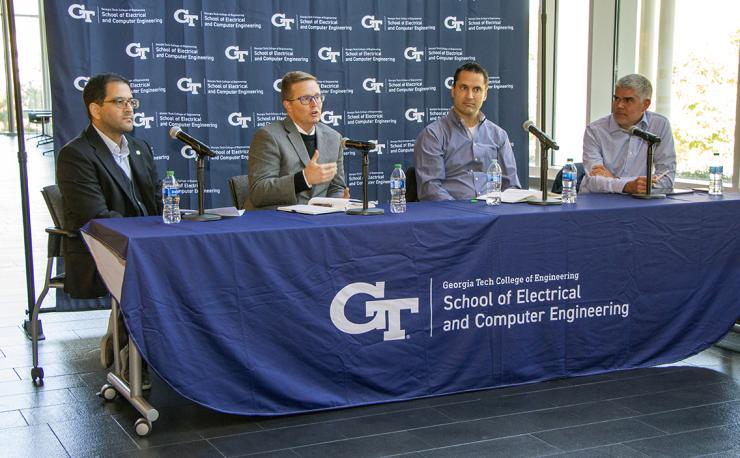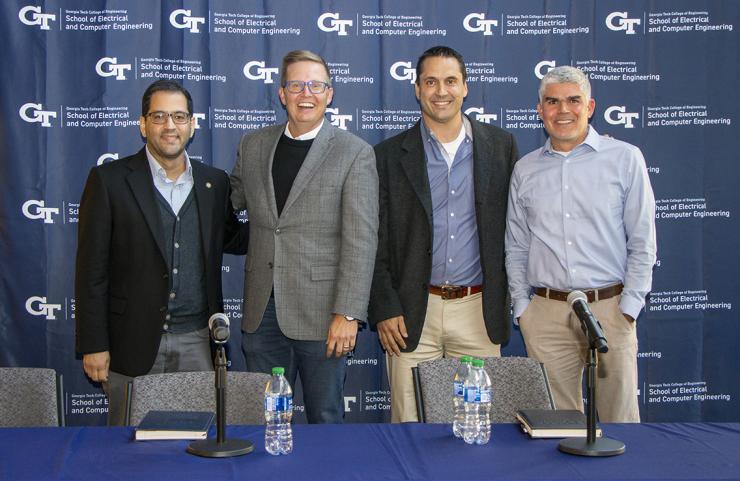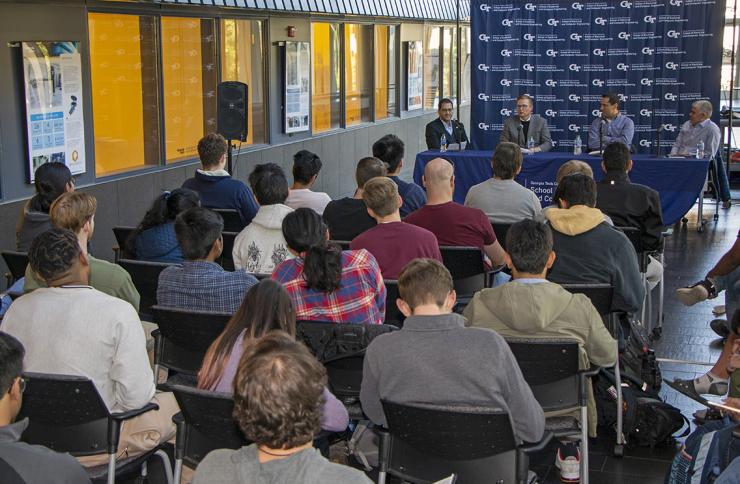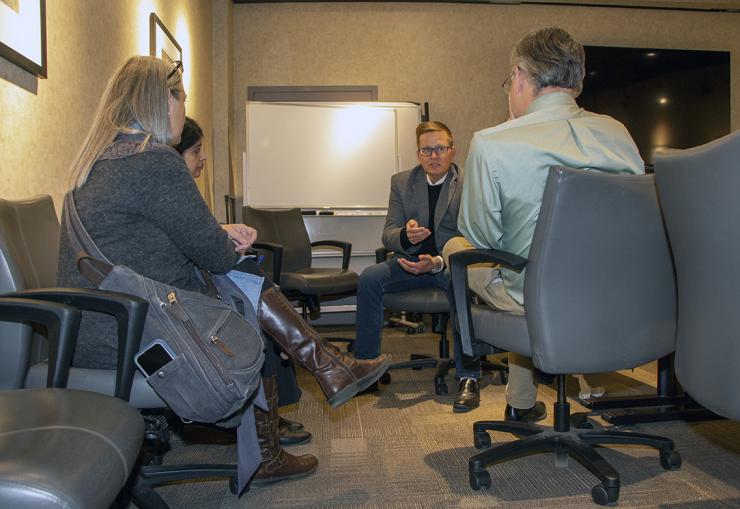Semiconductor Research Corporation Visits Georgia Tech ECE
Oct 27, 2022 — Atlanta, GA

During the visit, SRC’s President and CEO, Todd Younkin (second from left), participated in an ECE Panel Discussion with Roland Sperlich (second from right) of Texas Instruments and Fernando Mujica (right) of Apple Inc. The panel, moderated by ECE Professor Muhannad Bakir (left).
The Georgia Tech School of Electrical and Computer Engineering (ECE) will be a significant contributor to overall success of the nation’s goal to increase domestic semiconductor production and solidify its microelectronics workforce as collaborative efforts by industry and government come into focus.
The School’s established partnership with the Semiconductor Research Corporation (SRC), in particular, will be key to the country’s long-term semiconductor competitiveness. As specific plans and investment opportunities continue to be developed, Dr. Todd Younkin, SRC’s CEO and President, visited the Georgia Tech campus in Atlanta on October 20-21. SRC is a world-renowned, high technology-based consortium that serves as a crossroads of collaboration between technology companies, academia, government agencies, and SRC’s highly regarded engineers and scientists.
“At this specific moment in time, when the county and world are committed to innovation in semiconductor technologies, it’s critically important to address our significant challenges strategically and collaboratively,” said Arijit Raychowdhury, the ECE Steve W. Chaddick School Chair. “Without the leadership of SRC, many challenges would go unmet. Having Todd on campus to meet with students, researchers, and leadership is fundamental to our future plans together.”
Younkin joined the ECE Advisory Board at the start of this fiscal year (July 1, 2022). At SRC he leads a ~$90 million per year global research agenda supported by over 3,000 academic and industrial researchers, 27 international companies, and three U.S. government agencies (DARPA, NIST, and NSF).
Currently Georgia Tech is a partner in SRC’s Joint University Microelectronics Program (JUMP). JUMP supports long-term research focused on high performance, energy efficient microelectronics for end-to-end sensing and actuation, signal and information processing, communication, computing, and storage solutions that are cost-effective and secure. The program, launched under the direction of Younkin in 2018, has six multi-university, multi-disciplinary innovation centers with 137 faculty, 749 students, and 412 industrial engineering liaisons.
“Georgia Tech offers a unique combination of expertise and collaborative spirit that is an important part of any SRC program.” Younkin said during his visit. “The faculty prepares future engineers to hit the ground running when they enter the semiconductor engineering workforce, either in academia or industry. This is crucial in the face of the rapid changes occurring in the microelectronics landscape today.”
Younkin also praised Georgia Tech’s unique fabrication and packaging facilities. Few universities can support the entire microelectronics stack – from materials and devices to packaging and systems – like Georgia Tech does.
Raheem Beyah, the dean of the College of Engineering and Southern Company Chair, and Chaouki T. Abdallah, executive vice president for research at Georgia Tech, met with Younkin during the visit. Additionally, Younkin was able to discuss ECE’s Opportunity Research Scholars’ Program (ORS), an innovative undergraduate research program designed to enhance and expand the academic experience of undergraduate students majoring in ECE, with academic professionals, faculty members, and the talented ORS student researchers.
On the afternoon of Oct. 20, Younkin participated in an ECE Panel Discussion with fellow Advisory Board member Roland Sperlich of Texas Instruments and Fernando Mujica of Apple Inc. The panel, moderated by ECE Professor Muhannad Bakir, attracted around 80 students. During the panel, Younkin expressed the demand for engineers with good communication skills and emphasized the importance of diversity.
“In order for companies to develop market-ready solutions, it’s crucial they are talking the same language,” said Younkin. “Additionally, the field needs to further prioritize diversity and inclusiveness. Achieving an inclusive workforce that unlocks the talents inherent in all of us requires increasing the participation of women and under-represented minorities, as well as striking a balance between American citizens and talented people coming from other nations.”
Last year, SRC and the Defense Advanced Research Projects Agency (DARPA) announced JUMP 2.0, a new long-term university research collaboration that will advance information and communication technologies (ICT) critical to the country’s economic growth and national security. The program signifies a new chapter in SRC’s history of public-private partnership with DARPA, leading semiconductor and ICT companies, and the defense industrial base.
Like its predecessor, JUMP 2.0 will work with researchers at outstanding U.S. universities – including Georgia Tech – to create collaborative, multidisciplinary research centers. SRC and DARPA look to announce the JUMP 2.0 research centers in early 2023.

ECE Professor Muhannad Bakir, Todd Younkin of SRC, with Roland Sperlich of Texas Instruments and Fernando Mujica of Apple Inc.

Nearly 80 ECE undergraduate and graduate students attended the ECE Panel Discussion on October 20.

Todd Younkin, SRC’s President and CEO, discussing ECE’s Opportunity Research Scholars’ Program (ORS) with program leaders Greg Durgin (Faculty Director), Julie Ridings (Assistant Director), and Shanthi Rajaraman (Director).
Dan Watson
dwatson@ece.gatech.edu




